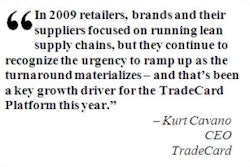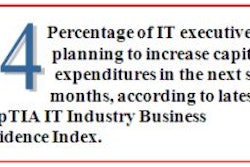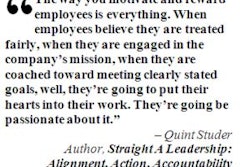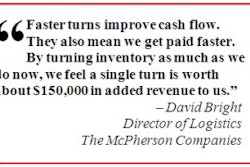
Peoria, IL — January 27, 2010 — Following recent reports that the economic downturn is continuing to linger as expansion of the gross domestic product slows, a new survey shows that 25 percent of U.S. manufacturers say they have seen no impact at all on their business due to the recession.
The survey of 150 manufacturers, commissioned by Advanced Technology Services (ATS) with Frost & Sullivan, suggests that large manufacturers seem to have weathered the storm the best, with 29 percent of companies with more than 1,000 employees reporting no impact at all. The report indicated that only 19 percent of companies surveyed said the economic downturn has had a "great" impact or "very great" impact on their business.
"This recession was a reality check for many businesses," said Jeff Owens, president of ATS. "I think those that reported seeing little or no impact were certainly in the minority. Many of our customers began drawing down their inventories early on in an attempt to circumvent getting hit hard, [and] that may have spared some of them. Others saw the early indictors and decided to focus their resources on core competencies and leave the rest to outsourced providers like us."
Larger companies (those with 1,000 or more workers) reported the least impact due to the recession, whereas midsize organizations reported seeing the greatest impact, saying that the economy has resulted in layoffs of full-time workers.
The aftermath of the recession has left many manufacturers wondering what the repercussions will be on the skilled labor shortage. According to the survey, respondents reported the lack of skilled labor is expected to cost their organizations on average $11 million dollars over the next five years. The cost reported is highest for larger companies and is estimated at $17 million dollars. The majority of respondents indicated they would fill positions with full-time workers when the economy recovers; however, close to a third said they would also fill positions through outsourcing with contract/flexible workforce.
"While some manufacturers reacted to the economic swings by cutting back or even eliminating in-house apprenticeship and training programs, vendors that handle IT, maintenance or repair were ramping up such programs," said Owens. "While manufacturers have implemented layoffs and early-retirement programs, vendors have cherry-picked those available workers."
Not everyone appears to agree that there will be a skilled labor shortage. In fact, only a quarter of respondents expect to be affected by a lack of skilled labor, with the greatest impact among midsize and larger organizations. One-third say the availability of skilled workers will not change, while 38 percent expect a surplus supply of skilled workers.
"I believe there are two reasons for these varying viewpoints," said Owens. "First, I believe the recession has caused many companies to be shortsighted and look at the numbers and potential problems for next quarter instead of next year and five years down the road — and that's when these Baby Boomers will be retiring and taking all their knowledge and experience with them.
"Second, manufacturers have repeatedly failed to make the case for the skilled labor shortage and now we are paying the price. There is a difference between low-skilled jobs that are easily transported to low-wage countries and the high-skilled jobs that do — and will — remain. These are the elite technicians who are skilled in hydraulics, robotics, electrical and computer science. Even if the economic recovery is slow, the emptying of the pipeline won't be."
Some manufacturers believe this points to a bigger public-policy issue the nation needs to address, especially larger organizations. In fact, 69 percent of survey respondents in both corporate and plant roles within their organization say the Obama administration should institute policies to encourage and promote skilled-trades training and education.
As manufacturers look to the future and attempt to move past the effects of the downturn, viewpoints on when a real recovery will take place vary widely. Thirty-six percent said economic growth will resume by the first or second quarter of this year, whereas 23 percent expect growth later in the third or fourth quarter. One-fourth of respondents don't expect growth until 2011 or later.
Small and large manufacturers don't see eye to eye on what's in store for U.S. manufacturing. Nearly a third of small manufacturers polled expect to see no growth at all in demand in 2010, with business only starting to pick up in 2011, whereas many bigger companies say they are already seeing tentative signs of growth and expect economic recovery to take hold this year.
"Companies of all sizes are certainly approaching this year with caution," said Owens. "Many of the larger companies aren't guaranteeing orders right now, and the smaller companies depend on supplying large manufacturers, so there's certainly a cyclical effect. One thing we feel strongly about is that the weak dollar will continue well into this year, and that means U.S.-based production will look more attractive to manufacturers, so companies need to stay flexible and be ready."
ATS worked with Frost & Sullivan on the online survey. From November 23–25, using an online methodology, Frost & Sullivan interviewed 150 manufacturing presidents, CEOs, COOs, CFOs, vice presidents, directors of operations, production managers and plant managers within the U.S. Respondents were screened to ensure they were familiar with the maintenance operations for the production and operations equipment within their facilities.
ATS offers outsourced production equipment maintenance. The company is headquartered in Peoria, Ill., with offices and services centers located in Greenville, SC; Chicago; Detroit; Monterrey, Mexico; Puerto Rico, the United Kingdom and China.
The survey of 150 manufacturers, commissioned by Advanced Technology Services (ATS) with Frost & Sullivan, suggests that large manufacturers seem to have weathered the storm the best, with 29 percent of companies with more than 1,000 employees reporting no impact at all. The report indicated that only 19 percent of companies surveyed said the economic downturn has had a "great" impact or "very great" impact on their business.
"This recession was a reality check for many businesses," said Jeff Owens, president of ATS. "I think those that reported seeing little or no impact were certainly in the minority. Many of our customers began drawing down their inventories early on in an attempt to circumvent getting hit hard, [and] that may have spared some of them. Others saw the early indictors and decided to focus their resources on core competencies and leave the rest to outsourced providers like us."
Larger companies (those with 1,000 or more workers) reported the least impact due to the recession, whereas midsize organizations reported seeing the greatest impact, saying that the economy has resulted in layoffs of full-time workers.
The aftermath of the recession has left many manufacturers wondering what the repercussions will be on the skilled labor shortage. According to the survey, respondents reported the lack of skilled labor is expected to cost their organizations on average $11 million dollars over the next five years. The cost reported is highest for larger companies and is estimated at $17 million dollars. The majority of respondents indicated they would fill positions with full-time workers when the economy recovers; however, close to a third said they would also fill positions through outsourcing with contract/flexible workforce.
"While some manufacturers reacted to the economic swings by cutting back or even eliminating in-house apprenticeship and training programs, vendors that handle IT, maintenance or repair were ramping up such programs," said Owens. "While manufacturers have implemented layoffs and early-retirement programs, vendors have cherry-picked those available workers."
Not everyone appears to agree that there will be a skilled labor shortage. In fact, only a quarter of respondents expect to be affected by a lack of skilled labor, with the greatest impact among midsize and larger organizations. One-third say the availability of skilled workers will not change, while 38 percent expect a surplus supply of skilled workers.
"I believe there are two reasons for these varying viewpoints," said Owens. "First, I believe the recession has caused many companies to be shortsighted and look at the numbers and potential problems for next quarter instead of next year and five years down the road — and that's when these Baby Boomers will be retiring and taking all their knowledge and experience with them.
"Second, manufacturers have repeatedly failed to make the case for the skilled labor shortage and now we are paying the price. There is a difference between low-skilled jobs that are easily transported to low-wage countries and the high-skilled jobs that do — and will — remain. These are the elite technicians who are skilled in hydraulics, robotics, electrical and computer science. Even if the economic recovery is slow, the emptying of the pipeline won't be."
Some manufacturers believe this points to a bigger public-policy issue the nation needs to address, especially larger organizations. In fact, 69 percent of survey respondents in both corporate and plant roles within their organization say the Obama administration should institute policies to encourage and promote skilled-trades training and education.
As manufacturers look to the future and attempt to move past the effects of the downturn, viewpoints on when a real recovery will take place vary widely. Thirty-six percent said economic growth will resume by the first or second quarter of this year, whereas 23 percent expect growth later in the third or fourth quarter. One-fourth of respondents don't expect growth until 2011 or later.
Small and large manufacturers don't see eye to eye on what's in store for U.S. manufacturing. Nearly a third of small manufacturers polled expect to see no growth at all in demand in 2010, with business only starting to pick up in 2011, whereas many bigger companies say they are already seeing tentative signs of growth and expect economic recovery to take hold this year.
"Companies of all sizes are certainly approaching this year with caution," said Owens. "Many of the larger companies aren't guaranteeing orders right now, and the smaller companies depend on supplying large manufacturers, so there's certainly a cyclical effect. One thing we feel strongly about is that the weak dollar will continue well into this year, and that means U.S.-based production will look more attractive to manufacturers, so companies need to stay flexible and be ready."
ATS worked with Frost & Sullivan on the online survey. From November 23–25, using an online methodology, Frost & Sullivan interviewed 150 manufacturing presidents, CEOs, COOs, CFOs, vice presidents, directors of operations, production managers and plant managers within the U.S. Respondents were screened to ensure they were familiar with the maintenance operations for the production and operations equipment within their facilities.
ATS offers outsourced production equipment maintenance. The company is headquartered in Peoria, Ill., with offices and services centers located in Greenville, SC; Chicago; Detroit; Monterrey, Mexico; Puerto Rico, the United Kingdom and China.







